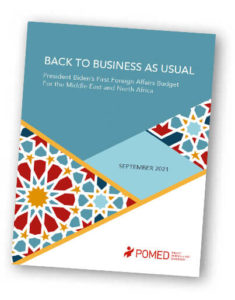 President Joseph R. Biden’s first international affairs budget is a dramatic reversal from the previous four requests under President Donald Trump. President Biden’s Fiscal Year (FY) 2022 request of $63.9 billion would significantly increase the foreign affairs budget not only from Trump’s paltry FY21 request of $44.1 billion, but also from the $55.5 billion appropriated by Congress in FY21. Similarly, for the Middle East and North Africa (MENA) President Biden’s request of $7.6 billion boosts foreign aid by 17 percent compared to Trump’s FY21 request.
President Joseph R. Biden’s first international affairs budget is a dramatic reversal from the previous four requests under President Donald Trump. President Biden’s Fiscal Year (FY) 2022 request of $63.9 billion would significantly increase the foreign affairs budget not only from Trump’s paltry FY21 request of $44.1 billion, but also from the $55.5 billion appropriated by Congress in FY21. Similarly, for the Middle East and North Africa (MENA) President Biden’s request of $7.6 billion boosts foreign aid by 17 percent compared to Trump’s FY21 request.
True to his word, President Biden’s request would also increase funding for democracy and human rights programs around the world. The FY22 request of $2.8 billion for programming that falls within the Governing Justly and Democratically (GJD) objective is 65 percent higher than the FY21 request by President Trump, 18.3 percent more than Congress’s FY21 appropriation, and 26.8 percent more than the FY20 allocation. In the MENA region, this trend continues. The FY22 request for democracy programs is more than double the FY21 request and 34 percent more than the U.S. government spent in FY20.
The budget request is an opportunity for the administration to demonstrate its foreign policy priorities, and it is clear that the administration is committed to increasing funding for foreign aid and democracy programs in particular. Yet while the Biden administration’s request increases support in key areas, it ultimately perpetuates the long-standing trend of securitizing U.S. aid to the MENA region, which despite the funding increases continues to relegate U.S. democracy programs to the margins of policy.
KEY FINDINGS FOR THE MIDDLE EAST AND NORTH AFRICA (MENA):
- President Biden’s FY22 request for the MENA region would more than double support for democracy and governance programs. The $453.6 million request for the GJD objective is 140 percent more than President Trump’s FY21 request of $189.2 million, the largest democracy and governance funding increase of any region in the world. The total FY22 GJD request for MENA is also, importantly, 34 percent more than the actual allocation of $337.8 million for MENA in FY20, the most recent year data is available.
- The president’s foreign aid budget request for MENA, despite his stated commitment to democracy programming, does not reflect a significant priority shift from previous administrations, instead perpetuating the preponderance of security assistance to the region. The $5.8 billion requested for security assistance represents 76 percent of the total requested for MENA. In comparison, democracy and human rights programs represent less than 6 percent of the requested funding for the region. In addition, the FY22 request for security assistance for MENA is $340 million (6 percent) more than the Trump administration’s FY21 request of $5.5 billion, which is a larger increase in actual dollars than for democracy assistance.
- Despite President Biden’s declaration that he would end the “blank checks” for Egypt’s authoritarian regime, the FY22 request seeks the same $1.3 billion in Foreign Military Financing that Egypt has received since 1987. The administration has also explicitly and repeatedly expressed opposition to Congress including human rights conditions on military aid to Egypt in the FY22 appropriations bill. The administration also used a loophole in the FY20 law to obligate $300 million of the $1.3 billion in military aid conditioned on human rights.
- The FY22 bilateral requests for Iraq, Jordan, and Morocco remained static relative to recent years’ appropriations laws even though citizens in all three countries are increasingly concerned about government corruption and repression. By choosing not to request further funding for democracy programs in these countries, the administration misses an opportunity to reprioritize U.S. assistance to better meet new U.S. objectives and the concerns of the countries’ citizens.
- While the administration’s request would increase bilateral aid for Lebanon by 22 percent compared to the FY21 appropriations law, all of that increase is for military aid to the Lebanese Armed Forces. The United States has provided more than $370 million in humanitarian assistance in FY21, but the need and demand for additional aid among the Lebanese people is just as great as among the LAF.
- The FY22 request of $219 million in bilateral assistance for the West Bank and Gaza and re-engagement with the Palestinian Authority is part of a reversal from the Trump administration’s policy toward the Palestinians. In addition, the Biden administration has announced that it would provide more than $360 million in economic, development, security, and humanitarian assistance for Palestinians from held-up prior year funds, including more than $150 million for the United Nations Relief and Works Agency.
Navigate to a specific country section:



